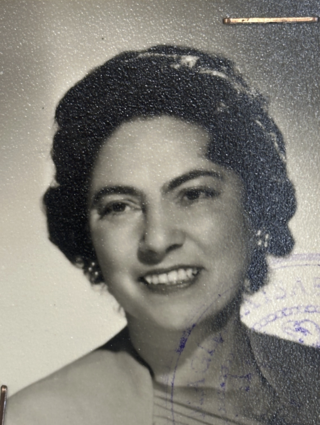Gertrude Leokadia Bokor

Personalia
Born:
Died:
Profession:
Persecution:
Aryanization 07.09.1938,
Forced labor 1942 - 1945
Memberships
Curriculum Vitae
Gertrude Leokadia Bokor was born in Vienna as the daughter of the Jewish coffee house owner Julius Bokor and his Catholic wife Maria, née Mottloch. Julius and Maria Bokor have been running the Café Schlössl in Count Nostitz's baroque palace near the Meidling Gate of Schönbrunn Palace since 1927. They lived in the apartment above.
After elementary school, Gertrude Bokor attended four years of secondary school and then a hotel management school. She then completed internships in hotels in France and with the French commercial attaché in Vienna. In the fall of 1936, she began a course at an officially approved language school in order to pass the state examination in French. On the side, she worked in her father's coffee house.
On March 12, 1938, she witnessed the demise of free and independent Austria with the invasion of the German Wehrmacht. With the occupation of Austria, German legislation was adopted and with it the 'Nuremberg Race Laws', according to which Gertrude Bokor was considered 'Half-Jewish' or 'Mischling I.
[...] Already in these early afternoon hours, the first floor restaurant and the garden slowly began to fill up with Jewish families; Aryan guests could not be noticed either on this occasion or later, after the provisional administrator had entered the restaurant. Despite efforts to get inconspicuously close to the occupied tables, my appearance together with my companion was immediately the object of special attention by the Jews present.
[...] The Jews present were all apparently accompanied by their entire families and no table could be found that was occupied by men alone.
[...] The Jews felt that they were among their own kind, no table-to-table intercourse could be perceived, but many visitors knew each other.
[...] Since there is a suspicion of illegal political discussions among the Jews frequenting this coffee house, only the most inconspicuous observation and eavesdropping on the Jews who did not feel that they were being observed could bring success, a prerequisite that is difficult for an Aryan, since his presence is immediately noticed among the purely Jewish clientele.
Julius, Maria and Gertrude Bokor, who had been robbed of their livelihood, were also evicted from their apartment. Gertrude Bokor went to Brussels as a nanny in spring 1939, but her residence permit was not renewed in August 1939 due to the threat of war and she returned to Vienna. Her parents found a room to sublet for a short time, but soon could no longer afford it as they were unable to find work. In order to survive, they sell all their belongings and receive support from Caritas.
When Gertrude Bokor returns to Vienna, she finds no work as a 'Mischling 1. Grades'. Her father Julius Bokor fled to Budapest in November 1939 to join his sister, but was arrested in February 1940 and deported to Kamenez-Podolsk in Ukraine in July 1941, where he was probably murdered in the Kamenets-Podolsk massacre.
From 1940 onwards, Gertrude Bokor repeatedly found casual work as an unskilled laborer and had to use her meagre income to support her mother, who was now in need of care. [Note: Her mother was so badly injured in a streetcar accident in 1940 that she became in need of care.] From 1942, she was conscripted into the Bosse workshops, a Wehrmacht supplier. There she had to work in dark, unheated and damp cellars, which was detrimental to her health.
As a conscript, she experienced the liberation of Austria in May 1945. Afterwards, she tried unsuccessfully to complete her supplementary examinations and worked in the art trade. She becomes involved in the ÖVP-Kameradschaft der politisch Verfolgten und Bekenner für Österreich.
However, the damage to her health from her time in service took its toll and Gertrude Bokor changed her job very frequently and was often on convalescence.
Places
Residence:
Citations
Wiener Stadt- und Landesarchiv (WStLA)
Matricula Online
Friedhöfe Wien - Verstorbenensuche
